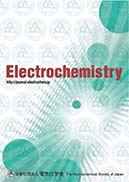
ELECTROCHEMISTRY
Scope & Guideline
Connecting Global Minds in Electrochemical Technology
Introduction
Aims and Scopes
- Electrochemical Biosensing:
A core focus on developing electrochemical biosensors for the detection of biomarkers, pathogens, and other critical analytes in clinical, environmental, and food safety contexts. - Bioelectrochemistry:
Research on bioelectrochemical systems, including microbial fuel cells and biocathodes, to explore energy generation and bioremediation applications. - Electroporation Techniques:
Investigation of electroporation methods for gene delivery and cancer treatment, including the optimization of electric field parameters for enhanced therapeutic efficacy. - Nanomaterials in Electrochemistry:
Utilization of nanomaterials to enhance the performance of electrochemical sensors and devices, focusing on their unique properties for signal amplification and sensitivity. - Electrochemical Mechanisms:
In-depth studies of the fundamental electrochemical processes and mechanisms involved in various applications, including corrosion, electron transfer, and reaction kinetics. - Interdisciplinary Applications:
Integration of electrochemistry with other fields such as biology, materials science, and environmental science to address complex challenges and develop innovative solutions.
Trending and Emerging
- CRISPR/Cas-Based Biosensors:
An increasing trend in the integration of CRISPR/Cas systems into electrochemical biosensors for sensitive and specific detection of nucleic acids, highlighting advancements in genetic diagnostics. - Sustainable Energy Solutions:
A growing focus on the development of bioelectrochemical systems and microbial fuel cells for sustainable energy generation, emphasizing the importance of renewable energy sources in electrochemical research. - Point-of-Care Diagnostics:
Emerging themes around portable and rapid electrochemical sensors for point-of-care applications, particularly in disease diagnosis and monitoring, showcasing a practical application of electrochemical techniques. - Nanotechnology and Hybrid Materials:
The use of hybrid nanomaterials and nanocomposites in sensor development is on the rise, indicating a trend towards enhancing sensitivity and selectivity in electrochemical assays. - Electrochemical Treatment of Diseases:
An increasing interest in using electrochemistry for therapeutic applications, particularly in cancer treatments through electroporation and electrochemotherapy, reflecting a convergence of electrochemistry with biomedical engineering.
Declining or Waning
- Traditional Analytical Techniques:
There has been a noticeable decline in the publication of papers focused solely on conventional electrochemical analysis methods, as the journal shifts towards more innovative and application-driven research. - Purely Theoretical Studies:
The journal has seen fewer articles dedicated to purely theoretical electrochemical modeling without practical applications, reflecting a trend towards experimental validations and real-world applications. - Basic Material Science:
Research centered solely on the basic properties of electroactive materials without direct applications in sensing or energy generation has become less prominent, indicating a shift in focus towards applied electrochemistry.
Similar Journals

ACTA CHIMICA SINICA
Advancing the Frontiers of Chemical KnowledgeACTA CHIMICA SINICA, published by SCIENCE PRESS, is a distinguished peer-reviewed journal in the realm of Chemistry, specifically focusing on general and miscellaneous chemistry fields. Since its inception in 1982, the journal has consistently contributed to the advancement of chemical research in China and beyond, maintaining a reputable standing within the academic community, evidenced by its 2023 Scopus ranking of #197 out of 408 in its category. With a current impact factor placing it in the Q3 quartile, ACTA CHIMICA SINICA aims to disseminate innovative research findings, covering a wide spectrum of topics within the discipline. Although it is not an open-access journal, it offers various access options through institutional subscriptions, ensuring that its high-quality content is available to a broad audience. Researchers, professionals, and students alike will find this journal a vital resource for keeping abreast of developments in the field and for contributing their own findings to an engaged scientific community.
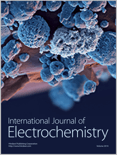
International Journal of Electrochemistry
Exploring the synergy of science and innovation in electrochemistry.The International Journal of Electrochemistry, published by HINDAWI LTD, serves as a premier outlet for cutting-edge research in the expansive field of electrochemistry. With an ISSN of 2090-3529 and an E-ISSN of 2090-3537, this open-access journal has been contributing to the advancement of scientific knowledge since 2011, making its content freely available to researchers, industry professionals, and students around the globe. The journal aims to foster innovation by disseminating high-quality research articles, reviews, and technical notes that encompass a wide range of topics from fundamental electrochemical principles to practical applications in energy storage, sensors, and material development. With a focus on promoting interdisciplinary collaboration and advancing the understanding of electrochemical systems, the International Journal of Electrochemistry is a vital resource for anyone involved in electrochemical research and its applications.
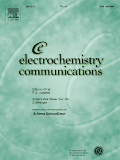
ELECTROCHEMISTRY COMMUNICATIONS
Connecting Groundbreaking Discoveries in Electrochemical ScienceELECTROCHEMISTRY COMMUNICATIONS, published by ELSEVIER SCIENCE INC, is a leading journal in the field of electrochemistry, holding a prestigious position in the Q1 quartile since 2023. With an impact factor reflecting its esteemed reputation, the journal ranks #15 out of 60 in the Scopus Chemistry category for Electrochemistry, placing it in the 75th percentile. Since adopting an Open Access model in 2019, it has garnered widespread visibility and accessibility, enabling researchers and professionals to share groundbreaking findings and foster innovation. Covering a wide range of topics from fundamental electrochemical research to practical applications, ELECTROCHEMISTRY COMMUNICATIONS serves as a critical platform for disseminating knowledge and advancing the field. The journal's commitment to quality and relevance positions it as a vital resource for academics and practitioners striving to stay at the forefront of electrochemical science.
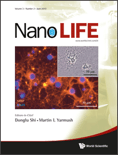
Nano LIFE
Bridging disciplines for a healthier tomorrow.Nano LIFE, published by World Scientific Publishing Company, is a multidisciplinary journal that delves into the dynamic fields of bioengineering, biomedical engineering, and pharmaceutical science, providing a platform for researchers to disseminate their cutting-edge findings. With an ISSN of 1793-9844 and e-ISSN 1793-9852, this journal emphasizes the significance of nanoscale research in healthcare and technology, positioning itself as a vital resource for professionals and academics alike. Although currently categorized in the Q4 quartile for multiple scientific disciplines in 2023, its unique focus on the intersection of nanotechnology and life sciences aims to elevate the discourse in these rapidly evolving sectors. Researchers can anticipate publishing innovative methodologies and results, contributing to the overall understanding and application of nanotechnology in medicine. Located in Singapore, Nano LIFE not only serves the global research community but also reflects the growing interest in nanotechnology across diverse fields.

Talanta Open
Advancing Analytical Chemistry Through Open AccessTalanta Open (ISSN: 2666-8319) is a prominent open-access journal published by Elsevier, dedicated to advancing the field of Analytical Chemistry. Established in 2020, the journal aims to foster innovative research and facilitate knowledge sharing in the analysis of chemical substances and their interactions. With an impressive Q2 ranking in the Analytical Chemistry category and a commendable Scopus ranking of #57/156, Talanta Open has quickly established itself as a vital resource for researchers, professionals, and students alike. The journal is known for its rigorous peer-review process and commitment to quality, ensuring that published content significantly contributes to the scientific community. By providing unrestricted access to high-quality research, Talanta Open underscores the importance of collaboration and accessibility in the ever-evolving landscape of analytical science.
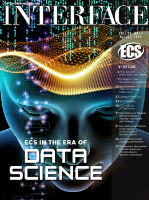
Electrochemical Society Interface
Transforming Electrochemical Discoveries into Practical AdvancesElectrochemical Society Interface is a prominent journal within the field of electrochemistry, published by the Electrochemical Society Inc. The journal, carrying the ISSN 1064-8208 and E-ISSN 1944-8783, serves as a vital platform for researchers, professionals, and students alike, aiming to bridge the gap between cutting-edge research and practical applications in the electrochemical domain. With a convergence period spanning from 1992 to 2024, the journal enjoys a respectable ranking in the Q3 Quartile of the 2023 Electrochemistry category. Although it does not currently offer open access options, its articles provide valuable insights into various aspects of electrochemical research and technology, enhancing the scholarly communication in this important field. By maintaining high standards in research dissemination, Electrochemical Society Interface continues to foster innovation and contributes significantly to the developments in electrochemical processes and materials.
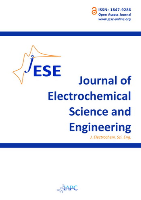
Journal of Electrochemical Science and Engineering
Exploring the Synergy of Chemistry and Engineering.The Journal of Electrochemical Science and Engineering, published by the International Association of Physical Chemists (IAPC), serves as a vital resource for researchers and professionals in the fields of electrochemistry, materials chemistry, and chemical engineering. With an Open Access model since 2011, this journal ensures that groundbreaking research is freely accessible to a global audience, promoting collaboration and knowledge sharing. Situated in Croatia, it showcases cutting-edge developments while focusing on applied aspects related to electrochemical technologies. Notably, the journal holds a commendable Scopus ranking, placing it within the Q3 quartile for multiple categories, including Chemical Engineering (miscellaneous) and Electrochemistry. By fostering innovative research and comprehensive reviews, the Journal of Electrochemical Science and Engineering plays a crucial role in advancing the understanding and application of electrochemical processes, making it an indispensable platform for academics and practitioners alike.

JOURNAL OF SOLID STATE ELECTROCHEMISTRY
Connecting Theory and Practice in ElectrochemistryThe Journal of Solid State Electrochemistry is a leading peer-reviewed journal dedicated to advancing the understanding and application of solid-state electrochemical systems. Published by Springer, this prestigious journal has been a staple in the field since its establishment in 1997, with an impressive range of topics covering Condensed Matter Physics, Electrochemistry, and Materials Science. It holds a notable Q2 category quartile ranking in several disciplines, including Electrical and Electronic Engineering, and boasts significant Scopus rankings—ranked #28 in Electrochemistry, showcasing its credibility and impact in the field. With a mission to disseminate high-quality research and innovative methodologies, the journal aims to foster cross-disciplinary collaboration among researchers, professionals, and students. While not open access, articles published in the Journal of Solid State Electrochemistry are integral for those exploring cutting-edge technologies through theoretical and practical approaches, ultimately enhancing our understanding of energy systems and materials' performance. Located in Germany, the journal continues to thrive internationally, providing a robust platform for scholarly communication.

RUSSIAN JOURNAL OF ELECTROCHEMISTRY
Catalyzing Progress in Electrochemical ScienceThe Russian Journal of Electrochemistry, published by Pleiades Publishing Inc, is a reputable scientific resource that caters to the dynamic field of electrochemistry. Since its inception in 1996, this journal has become a platform for the dissemination of cutting-edge research, exploring both foundational studies and innovative applications within electrochemical science. Despite currently holding a Q4 categorization in its field, the journal is dedicated to enhancing its scholarly impact and visibility, reflecting its commitment to fostering advancements in electrochemical technologies. With its ISSN 1023-1935 and E-ISSN 1608-3342, the journal strives to reach a global audience of researchers, professionals, and students alike. Though the journal is not open access, its contents are crucial for anyone looking to stay at the forefront of electrochemical research and developments. The journal's editorial board includes well-respected experts, ensuring that published articles contribute significantly to the scientific community and pave the way for future innovations in the field.
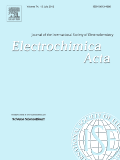
ELECTROCHIMICA ACTA
Pioneering Research in Electrochemistry and Chemical EngineeringELECTROCHIMICA ACTA is a prestigious academic journal dedicated to the field of electrochemistry and chemical engineering. Published by PERGAMON-ELSEVIER SCIENCE LTD, this journal stands out with its impressive impact factor and is categorized in the top quartile (Q1) for both Chemical Engineering and Electrochemistry in 2023, further cementing its role as a leading venue for cutting-edge research. With a publication history dating back to 1959 and converging into 2024, it has established a substantial archive of influential articles that explore various aspects of electrochemical processes, materials, and applications. Researchers and professionals in the field benefit from the journal’s high visibility, as it ranks remarkably well according to Scopus metrics, with a position in the 90th percentile for General Chemical Engineering and 84th percentile for Electrochemistry. Although ELECTROCHIMICA ACTA does not currently offer open access, it continues to serve as a vital resource for those seeking to expand their knowledge and explore innovative developments in electrochemical science.